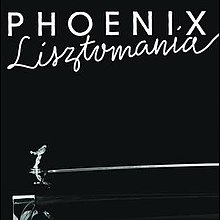Lisztomania (song)
| "Lisztomania" | ||||
|---|---|---|---|---|
 |
||||
| Single by Phoenix | ||||
| from the album Wolfgang Amadeus Phoenix | ||||
| B-side | Remixes | |||
| Released | 7 July 2009 | |||
| Format | ||||
| Recorded | 2008 | |||
| Genre | ||||
| Length |
|
|||
| Label | ||||
| Writer(s) | Phoenix | |||
| Producer(s) |
|
|||
| Phoenix singles chronology | ||||
|
||||
"Lisztomania" is a song by the French band Phoenix from their fourth album Wolfgang Amadeus Phoenix. It is their second single from the album, although a music video of the song was released before "1901". The music video shows them performing live and going outside to find a blimp like the one shown on the album cover. The song helped the album to be their most successful following their previous hit, "1901".
It peaked at #11 on the Bubbling Under Hot 100 Singles chart in the US and as well as #15 in Belgium. Phoenix released a remix edition of the album later in 2009, with two of the tracks being "Lisztomania" remixes by Alex Metric and 25 Hrs a Day. The song came in at #4 in the Triple J Hottest 100, 2009, making Phoenix the first French band to finish in the top 5 of the Hottest 100.
The term Lisztomania was used by Heinrich Heine to describe the intense fan frenzy directed toward Franz Liszt during his performances. The video to the song shows the band visiting the Franz-Liszt-Museum in Bayreuth.
"Lisztomania" (Alex Metric Remix) was featured in Gran Turismo for PlayStation Portable. The song was also featured in the season 6 finale of the HBO series Entourage and in episodes of The Inbetweeners.
A classical rendition of "Lisztomania", performed and arranged by Roger Neill, is featured as the opening theme to the Amazon Original Series Mozart in the Jungle, and also appears in the end credits to the program's third episode, "Silent Symphony".
In August 2013, Lawrence Lessig brought suit against Liberation Music PTY Ltd., after Liberation issued a takedown notice of one of Lessig's lectures on YouTube which had used the song by Phoenix, whom Liberation Music represents. Lessig sought damages under section 512(f) of the Digital Millennium Copyright Act, which holds parties liable for misrepresentations of infringement or removal of material. Lessig was represented by the Electronic Frontier Foundation and Jones Day. In February 2014 the case ended with a settlement in which Liberation Music admitted wrongdoing in issuing the takedown notice, issued an apology, and paid a confidential sum in compensation.
...
Wikipedia
